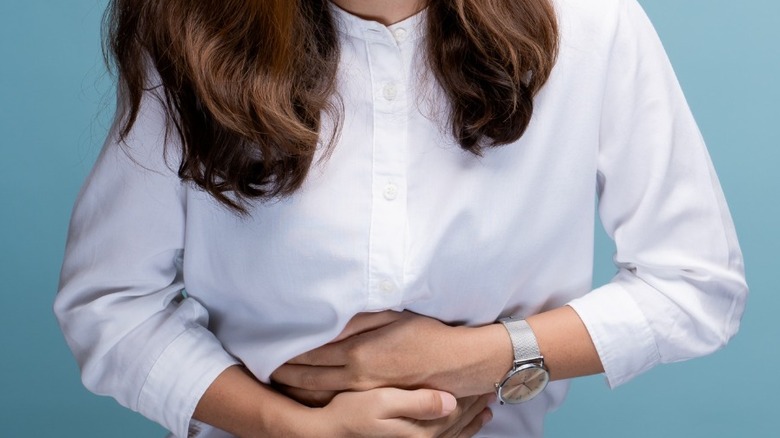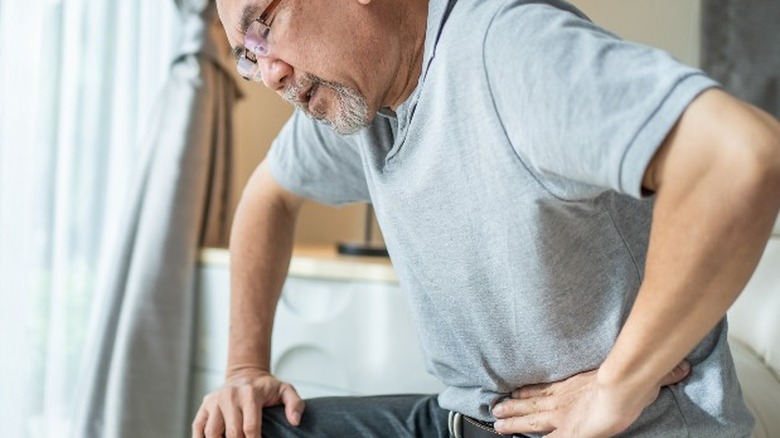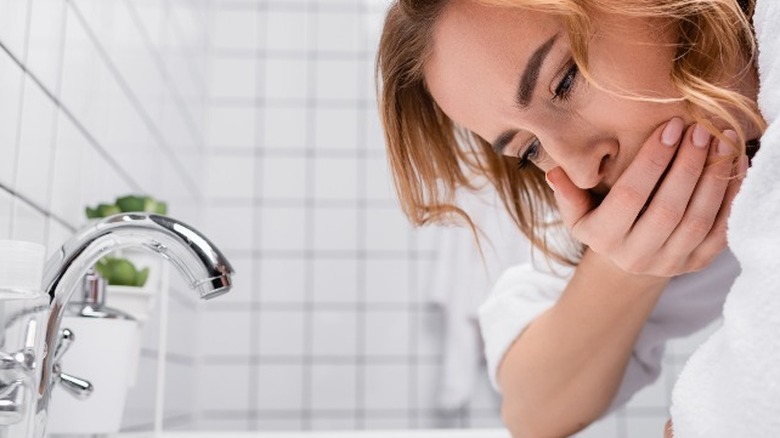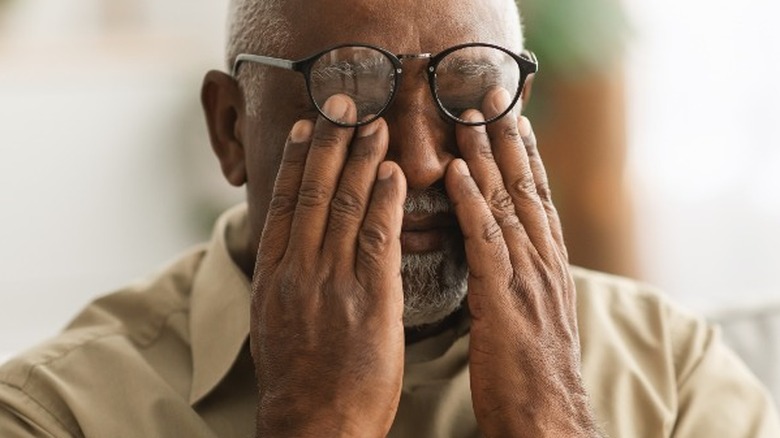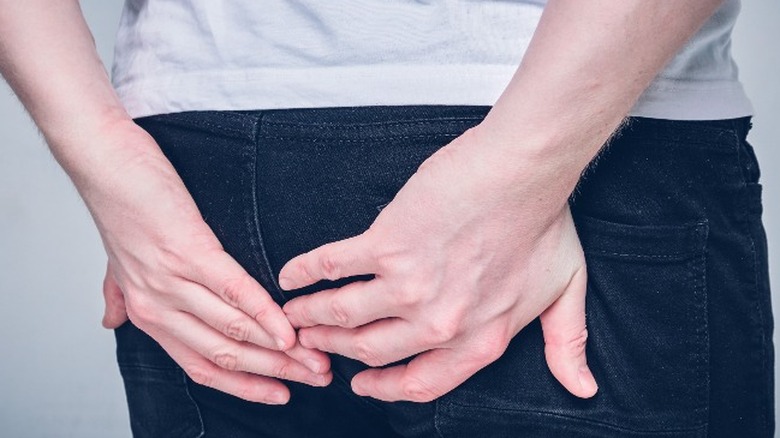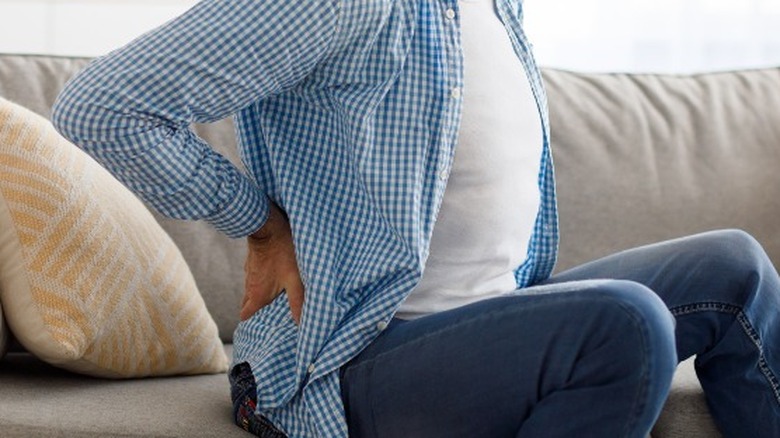What Happens To Your Body When You Are Constipated
It's common to experience occasional digestive issues, including constipation (per the Mayo Clinic). As explained by the Cleveland Clinic, at least 2.5 million constipated people in the United States see their doctors every year (which doesn't include those who choose not to consult with a medical professional when constipated). The National Institute of Diabetes and Digestive and Kidney Diseases (NIDDK) also shares that as many as 16 out of 100 adults show some constipation symptoms.
So, what is constipation? The NIDDK defines constipation as experiencing "fewer than three bowel movements a week" due to hard, dry stools that are painful or difficult to pass. The condition can also include the feeling of an incomplete bowel movement. It happens when stool moves too slowly through the digestive system, causing the colon to absorb more water from the food waste and producing hard stools (via Johns Hopkins Medicine).
The Cleveland Clinic notes that some people are more prone to recurring constipation. Referred to as chronic constipation, individuals who are less active, older, pregnant, have just given birth, do not ingest enough fiber, or are on certain medications are more likely to experience this gastrointestinal condition.
While constipation is typically not serious for most people, having less frequent or incomplete bowel movements can cause uncomfortable symptoms that may interfere with your daily routine (per the Mayo Clinic). Here's what happens to your body when you're constipated and how it can affect your life.
Bloating
When people become constipated, a common complaint is uncomfortable bloating and pressure in the abdomen (per Healthline). According to Yale Medicine, bloating is a feeling of being full or showing actual belly distension because the intestines are filled with air. Constipation can cause bloating due to a backup of gas building up in the intestines because you're unable to pass stools or have a complete bowel movement.
Bacteria in the colon help to digest food and create stool, which moves through the intestines and is expelled during a bowel movement. When the stool becomes hard and sits for too long in the gut, the gut bacteria continue to digest incoming food and create gas that is normally passed through the colon. However, the gas becomes blocked by the stool, eventually leading to painful bloating.
The longer the stool remains in the gut, the more gas is produced, which makes bloating increasingly uncomfortable for people who are constipated (via Johns Hopkins Medicine). If you're dealing with painful bloating, talk to your doctor about ways to alleviate the symptoms and the best way to treat your constipation.
Abdominal cramping
Along with bloating comes abdominal cramping for those who are constipated (per Healthline). As stool and gas build up in the gastrointestinal tract, the muscles in the colon walls contract to try to move the hardened stool through the bowel (via Medical News Today). When the colon wall contractions are too strong or out of sync, it can often result in stomach pain and cramps.
According to Medical News Today, irritable bowel syndrome (IBS) is often connected to abdominal cramping and pain. A common symptom of IBS is constipation, along with other digestive issues like diarrhea, gas, and mucus in the stool (per Medical News Today). With about 5-10% of people across the globe affected by IBS, many individuals suffering from this condition experience constipation, cramping, and abdominal pain (via the International Foundation for Gastrointestinal Disorders).
Also, research published in Microbiome shows that constipation can result in an increase of methane gas in the gastrointestinal tract as a product of microbial fermentation during digestion. The research also notes that elevated levels of this gas in the gut are associated with constipation and abdominal pain.
While abdominal cramping is often connected to constipation, there are other causes that could be more serious (per Cleveland Clinic). Discuss any abdominal pain you're experiencing with a healthcare professional if the cramping becomes serious or the pain continues even after a complete bowel movement.
Nausea
A lesser-known effect of constipation is nausea or the uneasy feeling in the stomach that typically occurs before vomiting (per WebMD). According to a medically-reviewed article in Insider, there are several reasons that an individual may experience nausea while constipated.
First, constipation results from stool building up in the intestines and restricting bowel movements. As the stool hardens and creates blockages, bacteria in the gut produce gas that leads to bloating and the feeling of being full (via Yale Medicine). This fullness may cause food to sit in the stomach for longer periods of time, resulting in a sick or nauseous feeling for some individuals (per Insider).
In addition, recent research on methane gas in the gastrointestinal tract of humans (per Microbiome) shows that increased methane levels occur as gut bacteria overgrow when an individual is constipated. This bacteria imbalance and build-up of methane gas can cause a person to feel nauseous while constipated (per Insider).
Moreover, the process of digestion and moving the bowels is a way for the body to detoxify and get rid of unwanted waste (via Healthline). When the body isn't able to move the waste through the digestive system at a normal pace due to constipation, it may create an increase in toxins in the body, which could cause nausea.
Hemorrhoids
People who are constipated often strain to expel hardened stool and empty their bowels. When the digestive system is backed up, pushing too hard during bowel movements can create pressure and swelling in the veins of the rectum and anus (per WebMD). These inflamed veins are referred to as hemorrhoids and can result in uncomfortable symptoms, such as pain, irritation, itching, and bleeding.
There are different types of hemorrhoids, including internal, external, and prolapsed hemorrhoids (via Healthline). These classifications will present differently, with some not being visible at all. However, you can see external or prolapsed hemorrhoids from the outside of the rectum as swollen red or blue lumps protruding from the anus (per Healthline).
According to the NIDDK, approximately 1 in 20 Americans will experience hemorrhoids, and half of adults over the age of 50 already do. While they are generally harmless, hemorrhoids can occur more often in people who have long-term or chronic constipation (via Johns Hopkins Medicine). Your doctor may provide recommendations on how to get relief from hemorrhoids, which may include treatment for constipation.
Fatigue
A research article published in Sage Journal notes that fatigue is a common symptom of irritable bowel syndrome (IBS), which includes constipation. Some study results included in the article show that women who suffered from different types of bowel patterns associated with IBS, such as constipation, also experienced moderate to severe fatigue symptoms.
Also, not drinking enough water can cause both constipation and fatigue, as explained by Healthline. As a result, they may occur together due to dehydration. According to WebMD, dehydration is a common cause of chronic constipation as the colon absorbs too much water from food waste to make up for not having enough water in the body. The result is hard, dry stool that is difficult to pass. Likewise, dehydration can also lead to fatigue and a lack of energy because water is essential for the cells in the body to distribute nutrients and dispose of waste (via Harvard Health Publishing).
Talk to your healthcare provider about a possible connection between your fatigue and constipation. There may be a way to combat both conditions, such as consuming more hydrating fluids. However, discuss options with your doctor to determine if your fatigue may be connected to another underlying cause.
Anxiety and mood disorders
Anxiety and depression may be additional ways that constipation takes a toll on the body and mind. According to a study in Gastroenterology and Hepatology from Bed to Bench, there is a prevalence of mood and anxiety disorders in patients who are constipated when compared to the general population. The research shows that constipated individuals may be more prone to anxiety, depression, panic attacks, social phobias, and suicidal ideas as a result of this gastrointestinal disorder.
Also, there seems to be a connection between irritable bowel syndrome (IBS) and increased stress levels (per Medical News Today). The research included in BMC Research Notes found that those with IBS, including constipated patients, experienced more chronic stress than those without gastrointestinal issues. As explained in a review in Progress in Neuro-Psychopharmacology and Biological Psychiatry, there is substantial evidence that shows increased stress hormones can be linked to depression.
However, there are several factors that can affect a person's stress or anxiety levels (via the Cleveland Clinic). It's crucial to discuss increased stress, feelings of depression, or changes in your overall mood with a healthcare professional to understand the cause and seek the proper treatment.
If you or someone you know needs help with mental health, please contact the Crisis Text Line by texting HOME to 741741, call the National Alliance on Mental Illness helpline at 1-800-950-NAMI (6264), or visit the National Institute of Mental Health website.
Poor sleep
A recent article published in BMC Research Notes includes study results that show a connection between poor sleeping habits and irritable bowel syndrome (IBS). There are several gastrointestinal symptoms associated with IBS, including constipation, bloating, and gassiness. The study found that people who were constipated found it particularly difficult to fall asleep, while nausea caused study participants to wake more frequently throughout the sleep cycle.
There may also be a connection between IBS and insomnia (per WebMD). A study included in Safety and Health at Work found a strong correlation between insomnia and constipation. The results show that regular bowel function can help to improve sleep quality, particularly in people who work shifts with a high prevalence of insomnia.
Poor sleeping habits can have a number of negative effects on the body, including depression, high blood pressure, increased risk of heart attack or stroke, obesity, and lowered immune system function (via the Cleveland Clinic). If constipation is keeping you up at night, it may be time to talk to your doctor to avoid these potentially harmful effects of poor sleep.
Acid reflux
Acid reflux, or gastroesophageal reflux disease (GERD), is the result of stomach acid flowing up into the esophagus, causing irritation, heartburn, chest pain, trouble swallowing, vocal cord inflammation, and an ongoing cough while sleeping (per the Mayo Clinic).
According to research published in the Journal of Neurogastroenterology and Motility, evidence shows there could be a connection between constipation and GERD. The study results also showed that participants who experienced an overlap of constipation and GERD tended to have worsened symptoms of both conditions and a poorer quality of life.
The Journal of Medical Hypotheses and Ideas published an article discussing the correlation between GERD and functional constipation, which are both common gastrointestinal conditions. The article noted that treatment for functional constipation might actually help to relieve GERD symptoms and prevent the recurrence of the disease.
If you suffer from constipation and GERD, it may be worth discussing a possible connection with your healthcare provider and options to treat both.
Fecal impaction
When chronic constipation continues without relief and hardened stool becomes impossible to pass, the effects on the digestive system can become more critical (per the Cleveland Clinic). Fecal impaction occurs when the feces in the rectum creates a blockage that requires medical intervention to pass. A healthcare provider may use several treatment options to remove the blockage, including physically removing the hardened feces, an enema, or laxatives to soften the stool.
In more serious cases of fecal impaction, the obstruction may need to be surgically removed to prevent ulcers, aspiration, perforation, and other life-threatening conditions, according to an article published in Clinics in Colon and Rectal Surgery. The research shows that some people may even need to have their colon or rectum surgically resected when there are severe complications from the fecal impaction.
Although recurrence of fecal impaction is common, there are ways to lower the risks and help to prevent the condition from coming back. Increased fiber and water intake, for example, can help manage and minimize the effects of fecal impaction.
Anal fissures
Another uncomfortable yet common occurrence in people with constipation is anal fissures (via the Mayo Clinic). When large stools become hard, they may result in tears in the lining of the anus during a bowel movement. These tears are called anal fissures, which can cause pain, bleeding, cracks in the anal skin, and skin tags around the fissure.
Because constipation makes it difficult to pass stool, feces often backs up and hardens as more water is absorbed through the colon (via Johns Hopkins Medicine). This may cause individuals to strain to have a bowel movement, which puts more pressure on the rectum and anus. As the hardened feces pass through the anus, tearing is likely to occur because there is no moisture in the stool to make it soft and easier to pass (per the Mayo Clinic).
Anal fissures may go away on their own after constipation symptoms subside, as explained in an article published by StatPearls. However, complications can occur that make it difficult for the anal fissure to heal, including recurrence. Treatment for anal fissures includes stool softeners, sitz baths, pain medication, and an increase in fluid and fiber intake. In cases of recurring or chronic anal fissures, a surgical procedure may be necessary.
Rectal prolapse
According to the American Society of Colon Rectal Surgeons (ASCRS), chronic constipation can lead to rectal prolapse, which happens when the rectum becomes loose and eventually slips outside of the body through the anus. When the muscles that support the rectum weaken, the rectum can easily drop out of place (per Johns Hopkins Medicine). While there are several factors that may cause rectal prolapse to develop, chronic constipation occurs in about 30-67% of cases (via ASCRS).
Although rectal prolapse may appear similar to hemorrhoids, the condition is quite different. Rather than lumps caused by the swelling of veins in the anus, the bulge created by a rectal prolapse is due to the rectum moving with the stool being passed during a bowel movement and protruding outside the anus (per the Cleveland Clinic). It is also a condition that doesn't go away on its own, while hemorrhoids typically do.
If you frequently strain during bowel movements because of chronic constipation and suddenly feel pressure or a bulge in your anus, it's time to see your doctor. You may be experiencing rectal prolapse, which will only get worse over time. Surgery is needed to repair the damage to your rectum and improve rectal prolapse in adults.
Preventing constipation
While constipation isn't necessarily an immediate cause for concern, ongoing constipation can lead to an increased risk of complications (via Stanford Medicine). Fortunately, there are steps you can take to reduce the likelihood of developing constipation and the uncomfortable effects of the condition.
According to Cedars Sinai, one of the best ways to relieve and prevent constipation is to ingest more fiber. Eating more fruits, vegetables, and whole grains promotes healthy digestion, which helps move food through the colon. Research published in the World Journal of Gastroenterology shows that eating more fiber can help increase stool frequency in people who are constipated. Women should aim for at least 21 grams of fiber per day, while adult men should try to eat a minimum of 30 grams of fiber daily (via the Mayo Clinic).
Staying hydrated is another excellent way to keep constipation at bay. Water is necessary for digestion, and getting enough hydrating liquids will help to keep things regular (per WebMD).
In addition, a lack of exercise is connected to constipation (via Harvard Health Publishing). Good muscle tone helps digestion and regular bowel movements, so it's worth it to stay active if you're constipated. Even a quick 10-15 minute daily walk can make a significant difference in the function of your digestive system (per WebMD).

